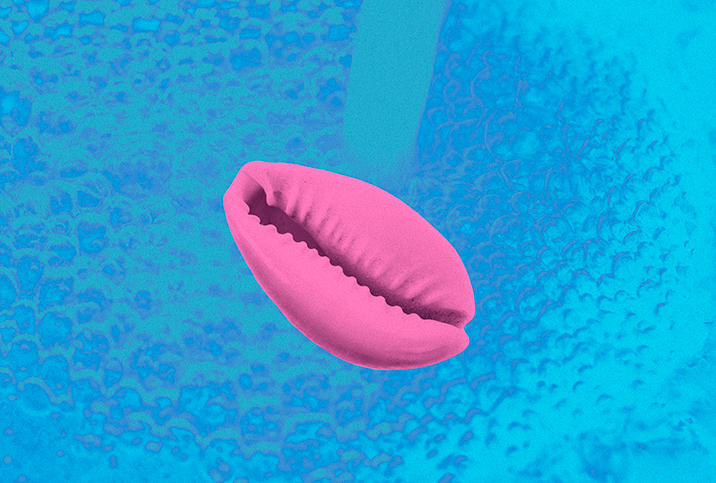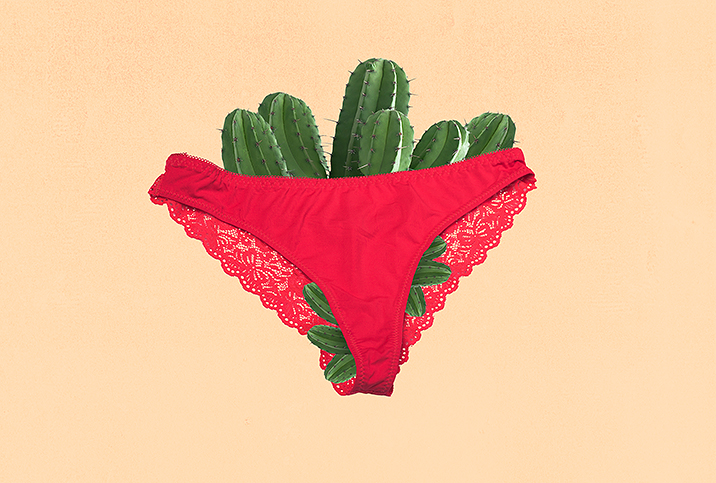Is Summer Ravaging My Vagina? (Short Answer: Yes)

A couple of summers ago, I was lounging on a beach in coastal New Hampshire admiring the ocean, unaware I'd wake up the next morning with an itchy browntail moth caterpillar rash all over my nether regions. It wasn't pretty. That was my first dose of summer's unkindness to vaginas and vulvas, and ever since I've become hyperaware of all potential enemies, such as pools, sweaty spandex and Mother Nature herself.
Between chlorine, drenched workout gear and dripping swimsuits, your vagina's pH can easily get knocked off-balance in the summer months, potentially leading to bacterial vaginosis and yeast infections. No fun. The good news is there are simple ways to avoid the disruptions without disrupting your hot vax summer.
Excessive heat
Hello, heat domes! Hot weather = sweating = sweating down there. If you're spending a significant amount of time working out in sweltering temps, be mindful that lounging too long in moist underwear can throw the bacteria in your vagina off-balance, promoting a yeast infection. "It does not mean that you should not go outside and enjoy summer," said Christine Greves, M.D., an OB-GYN based in Orlando, Florida. "It just means that you should be aware and consider packing a change of clothes if that happens."
While you can't control the weather or your sweat level, you can dress appropriately for the temperature. Wear cotton underwear and breathable clothing—not too tight—such as dresses. "If you want to wear tight clothes, make sure you allow the vulvovaginal tissue an opportunity to breathe," said Corey Babb, D.O., an OB-GYN based in Osage Beach, Missouri.
Chlorine
Since chlorine kills bacteria, could it kill the bacteria in your vagina, too? In theory, yes. Chlorine found in pools is very acidic, which can affect the vagina's pH, potentially resulting in a yeast infection, bacterial vaginosis and irritation. Chlorine also acts as a drying agent, which is never a phrase you want associated with your vagina.
The good news is the good ole labia—evolution's gatekeepers for the vagina—should protect you. If, say, copious amounts of chlorine were to be introduced into the vagina, it could cause a shift in the bacterial composition, potentially leading to irritation and discomfort, but that's unlikely to occur from an ordinary splash in the pool.
So should you cut your pool time short? No, Babb said not to worry. "Millions of women swim daily during the summer and do not have any vaginal problems," he said, "so it would have to be an excessive amount that made it past the natural barrier of the labia to cause issues."
Wet bathing suit
Speaking of pools, the riskier aspect to your vagina isn't chlorine so much as wearing a wet swimsuit. "Putting on a wet bathing suit over and over and over again is a very easy way to cause vulvar irritation," Babb said, and that can lead to other concerns, such as a urinary tract infection. The solution is simple: Change into dry clothes as soon as you're done swimming.
Sand
It's not necessary to speculate how or why sand could get into your vagina, but let's say it did. Sand could cause abrasions, and it may carry pathogens. "Think of what walks on it," said Greves. There's humans, who may drop picnic snacks, and animals, who drop their, well, droppings.
"If actual granules of sand were to make it into the vagina, it would most likely cause a substantial amount of irritation," Babb added. "That said, with gravity, and the natural mucus production of both the cervix and the vagina, those granules would hopefully be 'washed out' in a short amount of time."
What is much more common is sand getting trapped between the labia and underneath the clitoral hood. In those instances, you can expect lots of irritation, itching and burning. "Thankfully, vulvar structures can be washed with just warm water at home, and that sand can be easily removed," Babb said.
If sand persists in your vagina, the best course of action is to see your gynecologist to have your vagina irrigated with sterile saline or another neutral solution.
Sweaty spandex
While you may thrive during a warm summertime workout, your vagina—trapped in sweaty synthetic fabrics—likely feels differently. "Anything that promotes a moist, warm environment can also promote a friendly environment for yeast to live," Greves said.
"The biggest thing we see in terms of vaginal health would be an increase in the likelihood of vaginitis, such as bacterial vaginosis or candidiasis, a yeast infection," Babb said. Lots of exercise clothes make it difficult for tissue to properly breathe, which can in turn increase the rate of infection. If yeast becomes more prominent in the vaginal area, you may start to feel itching and have a white, cottage-cheese-like discharge, in which case you should consult your OB-GYN.
Luckily, infection prevention is easy. Remove your sweaty spandex and shower immediately after exercising. Babb also recommends sleeping without underwear—doctor's orders!—in an effort to "air out" the tissue as much as possible. That cuts down on the likelihood of infection.
Mosquito bites
Get one mosquito bite on your vulva and you'll never forget to cover up when the mini blood suckers are out again. While rare, if a mosquito makes its way to your vulva (ouch!), treat it as you would a mosquito bite anywhere else on your body. Topical, over-the-counter anti-itch creams, such as cortisone or calamine lotion, are doctor-approved to apply to the vulva. Just try to resist the urge to scratch.
With a little awareness—and a change of dry clothes—it's fairly simple to keep both a balanced pH and your summer of fun.
As for caterpillar rashes? Good luck.


















